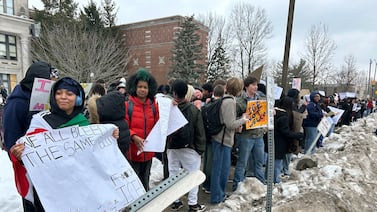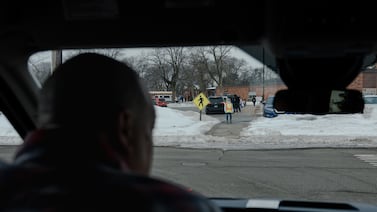Sign up for Chalkbeat New York’s free daily newsletter to get essential news about NYC’s public schools delivered to your inbox.
New York will join its neighbors, New Jersey and Connecticut, pushing for climate change education for all K-12 schools.
The Board of Regents, New York’s agency that oversees the state’s Education Department and supervises education policies, introduced an amendment this week that would implement climate education as a high school graduation requirement.
Back in July, the Board of Regents approved the “portrait of a graduate,” a framework redefining graduation requirements as the state moves away from relying on Regents exams by the 2027-28 school year. The climate change classes will be a new graduation requirement for high schools.
Grades 5-12 must add climate education to their programs by the 2027-28 school year, followed by grades K-4 a year later. (The amendment also mandates the addition of financial literacy a year before the climate education course requirements. New York City has made its own push for financial literacy.)
The proposed curriculum can be woven into existing courses, including subjects like social studies, health, and math or become a standalone course, officials said. The board provided a broad outline of what climate education entails: understanding what causes climate change, how it affects ecosystems and people, and the possible solutions to confront it.
“The proposed amendment provides districts with flexibility and how they implement climate education,” said Santosha Oliver, assistant commissioner for the Office of Standards and Instructional Programs under the state’s Education Department.
The state is behind its neighbor, New Jersey, which has funded millions since 2020 to support the state’s climate education initiatives. Connecticut, Maryland, and states across the country like California, Colorado, and Washington have also taken significant steps to improve climate education.
Some climate organizations, however, are concerned about whether the state will adequately fund the initiative. The National Wildlife Federation’s Climate & Resilience Education Task Force Policy Committee, sent a letter to Gov. Kathy Hochul in September, asking her to dedicate $536,500 for hiring staff within the state’s Education Department for the 2027 fiscal year. The task force designed the budget proposal in partnership with the Education Department.
This is the third year the task force has requested the funding.
“We’re talking about just over half a million dollars, which is 0.001% of the total education budget, and about the same amount of money that was given to a golf tournament last year,” said Emily Fano, the climate education director of the task force.
Hochul is expected to outline her budget plans in January at the State of the State address. Her office is aware of the amendment and will review it ahead of next year’s state budget, said Emma Wallner, spokesperson for the governor’s office.
After the governor endorsed Zohran Mamdani for mayor, Fano reached out to his campaign, hoping it could push the demand for funding. His team has not responded.
“[Mamdani] helped develop the green healthy schools platform. And so we thought that given that recent endorsement, that it would be really wonderful if he could whisper in her ear about this,” she said.
New York students have shown particular interest in climate education, with student enrollment surging from 52,000 to 140,000 between the 2023-24 and 2024-25 academic year, according to state Education Department data. Queens and Brooklyn saw the highest number of students enrolled in such courses.
“I have gotten so many calls … from students, students who have groups all over the state advocating for climate education,” said board member Frances Wills.
At the Harbor Middle School in Red Hook, Brooklyn, climate education has been at the forefront since its founding four years ago. Students grew 100 pounds of fresh produce and painted a mural about the state’s climate threatened bird species.
“The climate crisis cannot be solved by scientists alone,” said Lynn Shon, a teacher who co-founded the school. “Addressing the climate crisis requires a new kind of learning, a kind of learning that crosses disciplines and not only prepares students for the world they are inheriting, but gives students opportunities to act now.”
If passed, following a 60-day comment period, the change will take effect on March 25.
Correction: A previous version of this story said Colorado, Washington, and Maryland have made climate education compulsory. These states have taken measures to boost climate education but don’t mandate it.
Ananya Chetia is a reporting intern for Chalkbeat New York, covering NYC public schools. Contact Ananya at achetia@chalkbeat.org






